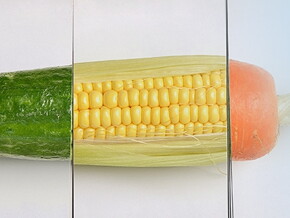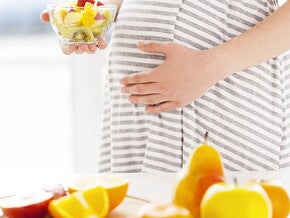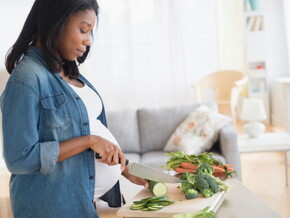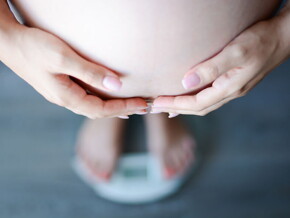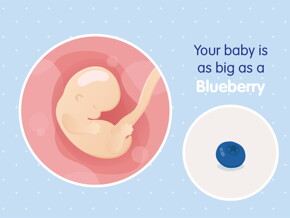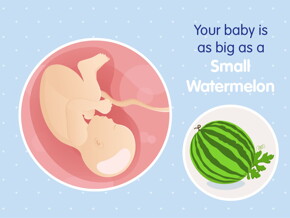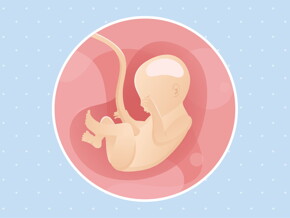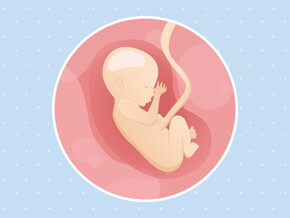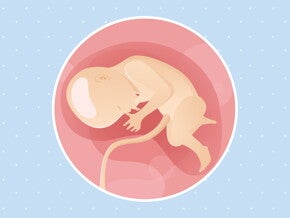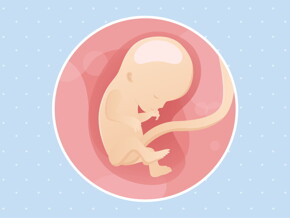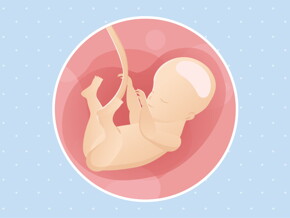
Eating well: It helps you…
Maintain a healthy weight
How?
Help yourself gain weight at a healthy rate with sensible meal choices.
Why?
You’ll improve your chances of having a strong, full-term baby with a low risk of health problems after birth.1
Meet your increased need for iron
How?
Incorporate lots of iron-rich foods into your diet, before, during and after pregnancy.
Why?
You’ll help prevent iron deficiency and anemia (plus, the fatigue and decreased energy levels they can cause), as well as potential premature delivery and low birth weight.2
What else?
Canadian health experts recommend taking a daily multi-vitamin containing iron throughout pregnancy.3 Learn more about the benefits of prenatal supplements during pregnancy here.
Get the energy you need
How?
Eat about 300 extra calories per day, or 2-3 extra Food Guide servings during your second and third trimester.4
Why?
It takes extra energy to develop a healthy baby, and that energy comes from calories.
What else?
Remember, eating for two doesn’t mean eating twice as much!
Check off essential nutrients
How?
Pick out healthy options including reduced-fat and fat-free dairy products. For more tips on a healthy pregnancy diet, see Healthy Pregnancy Diet & Nutrition
Why?
These products supply calcium, as well as protein, vitamin D, B vitamins, and magnesium—all essential for the development of your baby’s bones, muscles, and nerves.
Speed your recovery after delivery
How?
Eat energy-rich and nutrient-rich foods.
Why?
Good nutrition is essential to your body mending itself after your baby is born.
Navigate common pregnancy concerns
How?
Even though it’s not up to you what your body will have to handle (serious complications are rare, fortunately), keep yourself ready for what most women go through by maintaining a good diet.
Why?
You can minimize, and often avoid, heartburn, constipation, fatigue, mood swings, and other minor nuisances.
Access more information on common pregnancy concerns and tips for navigating through them here.
Eating well: It helps your baby…
Get enough folic acid early in your pregnancy
How?
Add a prenatal multivitamin containing folic acid to a healthy diet containing folic acid-rich foods. Read more about the benefits of folic acid during pregnancy here.
Why?
You’ll be lessening the chance of neural tube defects, such as spina bifida, that often occur before most women even know they’re pregnant.
What else?
Canadian healthcare experts recommend women who are thinking about having a baby should start taking a prenatal multivitamin containing 0.4-1.0 mg folic acid 10-12 weeks before conception to help prevent neural tube defects.4,5
Benefit from high quality protein
How?
Eat a healthy amount of meats, chicken, fish, beans, tofu, milk, and eggs right from the start.
Why?
You want to maximize the potential for your baby to have strong muscles, ligaments, hair, fingernails, bones, brain tissue, blood, and other tissues.
Get enough calcium
How?
Consume 1000 mg of calcium a day with 2-3 Food Guide Servings of dairy. (You’re right, you’re not restricted to just milk—¾ cup of yogurt, 50 g of cheese or a cup of a fortified soy beverage can replace one cup of milk.)
Why?
Supply calcium that contributes to healthy bones and teeth, while preventing this mineral from being taken from your bones to give to your baby.
What else?
Many vegetables and legumes, such as spinach, broccoli, and navy beans, are also sources of calcium.
Arrive at a healthy birth weight
How?
You guessed it—always follow a nutritious diet and gain a healthy amount of weight during pregnancy.
Why?
Increase your likelihood of having a healthy, strong baby.
Fantastic Fibre
You’re about to discover (hopefully not first-hand) that pregnancy can also carry some digestive tract problems—including constipation and hemorrhoids. Fortunately, there’s usually a simple explanation and getting enough fibre can help minimize or (hopefully again) alleviate these issues. You can help even more by staying active and making lots of fluids part of that active lifestyle. Drinking 8 glasses of fluids each day, especially warm or hot liquids, can play a role in relieving the discomfort of constipation.
The recommended daily fibre intake during pregnancy is 28 grams.3
Get your 28 grams of fibre with help from a well-planned diet that includes a variety of fruits, vegetables, whole grains, peas, beans and lentils, nuts and seeds.
Know your type
Each of these two types of fibre, which you’ll only find in plant foods, has a different function.
Insoluble fibre
- Keeps the digestive system in good working order.
- Helps soften stools (it’s a natural laxative, after all).
- Speeds up the movement of waste material through the digestive system (Bye, bye constipation).
Good dietary sources of insoluble fibre: Whole grains, wheat bran cereal, vegetables, fruits, as well as dried peas and beans.
Soluble fibre
- Helps lower blood cholesterol levels.
- Regulates blood sugar levels.
- Needs to make up about 10 grams of your daily fibre intake.
Good dietary sources of soluble fibre include: Fruits, vegetables, oats, barley, dried peas and beans, as well as psyllium fibre.
Digestive Disturbances
As your pregnancy progresses, your digestive system may react to your body’s changes.
First trimester
You may have some nausea, food aversions, or cravings that can disturb the normal digestive process. (Any change in your diet can keep you from being regular.)
Second trimester
Slower digestion can result in constipation. (The hormone progesterone has kicked in by now—it relaxes the smooth muscles lining the digestive tract.)
Third trimester
Elimination can become difficult, sometimes leading to hemorrhoids. (Your growing baby is now engaging and pressing on some of your internal organs and blood vessels, making your digestive system work less smoothly than you’d like.)
By now it probably goes without saying, but a healthy diet and enough fibre are super-important to your baby and you—especially when it comes to possible digestive disturbances.
Pregnancy cravings
- Cravings are by-products of your pregnancy hormones (same goes for aversions).
- Common faves? Sweets, fruits, salty or spicy foods, and hard or chewy foods top most Mommy lists.
- Craving junk? Seek out a healthier alternative. (Sorry doughnuts, this lower-fat bagel will do the trick.)
Pregnancy aversions
- Strong aversions to foods are common during pregnancy, especially during the first trimester.
- Got an aversion to a nutritious food? Sub in an equally nutrient-dense food. (Fish? Yuck! Guess I’ll settle for chicken—it’s high in protein.)
With both food cravings and aversions, it’s best to follow your body’s signals—all while, say it with us now (and this goes for your diet in general), making healthy choices.
References:
1 Health Canada, 2011. Healthy weight gain during pregnancy. Available at: https://www.canada.ca/en/health-canada/services/canada-food-guide/resources
2 Health Canada, 2009. Prenatal nutrition guidelines for health professionals – iron contributes to a healthy pregnancy. Available at: https://www.canada.ca/en/health-canada/services/publications/food-nutrition/prenatal-nutrition-guidelines-health-professionals-iron-contributes-healthy-pregnancy-2009.html
3 Health Canada, 2019. Healthy eating and pregnancy. Available at: https://www.canada.ca/en/public-health/services/pregnancy/healthy-eating-pregnancy.html
4 Health Canada, 2010. Prenatal Nutrition Guidelines for Health Professionals – Background on Canada’s Food Guide. Available at: https://www.canada.ca/en/health-canada/services/publications/food-nutrition/prenatal-nutrition-guidelines-health-professionals-background-canada-food-guide-2009.html
5 Wilson RD et al. Pre-conception Folic Acid and Multivitamin Supplementation for the Primary and Secondary Prevention of Neural Tube Defects and Other Folic Acid-Sensitive Congenital Anomalies. SOGC Clinical Practice Guideline, No. 324. J Obstet Gynaecol Can. 2015;29(12):1003-1013.
6 Institute of Medicine. Dietary reference intakes for calcium, phosphorus, magnesium, vitamin D and Fluoride. Washington: National Academies Press, 1997.
7 Daily Adequate Intake (AI) of total fibre for pregnant women aged 19-50 years old (Institute of Medicine. Dietary, Functional and Total Fiber. In: Dietary reference intakes for energy, carbohydrate, fiber, fat, fatty acids, cholesterol, protein, and amino acids. Washington: National Academies Press, 2005.)










